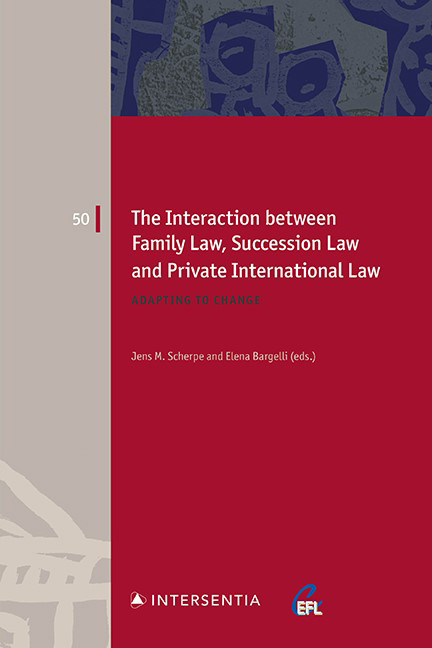Book contents
- Frontmatter
- Acknowledgements
- Contents
- List of Cases
- List of Contributors
- The Interaction between Family Law, Succession Law and Private International Law: An Introduction
- PART I THE IMPACT OF DEVELOPMENTS IN NATIONAL FAMILY LAWS ON EU PRIVATE INTERNATIONAL LAW
- PART II THE IMPACT OF EU PRIVATE INTERNATIONAL LAW ON NATIONAL FAMILY LAWS
- PART III THE IMPACT OF NATIONAL SUCCESSION LAWS ON EU PRIVATE INTERNATIONAL LAW
- PART IV THE IMPACT OF EU PRIVATE INTERNATIONAL LAW ON NATIONAL SUCCESSION LAWS
- Index
- European Family Law Series
The Interaction between Family Law, Succession Law and Private International Law: An Introduction
Published online by Cambridge University Press: 25 May 2021
- Frontmatter
- Acknowledgements
- Contents
- List of Cases
- List of Contributors
- The Interaction between Family Law, Succession Law and Private International Law: An Introduction
- PART I THE IMPACT OF DEVELOPMENTS IN NATIONAL FAMILY LAWS ON EU PRIVATE INTERNATIONAL LAW
- PART II THE IMPACT OF EU PRIVATE INTERNATIONAL LAW ON NATIONAL FAMILY LAWS
- PART III THE IMPACT OF NATIONAL SUCCESSION LAWS ON EU PRIVATE INTERNATIONAL LAW
- PART IV THE IMPACT OF EU PRIVATE INTERNATIONAL LAW ON NATIONAL SUCCESSION LAWS
- Index
- European Family Law Series
Summary
THE AIM OF THIS BOOK
At the national level, the rules of substantive family and succession law work with private international law rules created specifically for these substantive laws. Hence, there cannot be any question that there is an interaction between the substantive family and succession law and private international law and that they significantly influence each other.
However, over the last 20 years, private international law instruments by the European Union (EU) in family law, and more recently also in succession law, have replaced or at least supplemented national private international law instruments. Given that these the instruments are intended to apply to all EU Member States, and thus to jurisdictions with different legal traditions and vastly different approaches to family and succession law, it was inevitable that frictions would arise. The aim of this edited collection is to look at these frictions or, more precisely, to map elements of the interaction between national family and succession laws, and EU private international law instruments in these fields. Given the breadth of the fields, it of course is not possible here (nor was it ever the intention) to offer a conclusive analysis of these interactions; rather, this volume has collected views by a dozen scholars from different jurisdictions on specific topics to provide an insight into how this interaction has had an impact on national laws and (EU) private international law. Hopefully this can and will provide a basis for further study, but will also be useful when future private international law instruments are being considered or drafted, and will facilitate a more open debate between European institutions and national stakeholders.
INFLUENCE WITHOUT LEGAL COMPETENCE?
Even though this should be obvious, it is necessary to state at the outset that of course the EU has no competence to legislate in the areas of substantive family or succession law, which the institutions are at pains to reiterate frequently. Hence, there is no EU family law or EU succession law, and no such laws can be created directly by the EU institutions. But since the Treaty of Amsterdam came into force in 1999, the EU has gained the competence to regulate judicial cooperation in civil matters and therefore in private international law matters.
- Type
- Chapter
- Information
- The Interaction between Family Law, Succession Law and Private International LawAdapting to Change, pp. 1 - 10Publisher: IntersentiaPrint publication year: 2021



